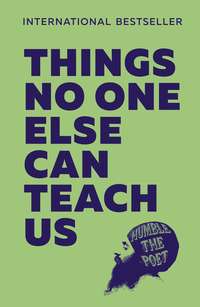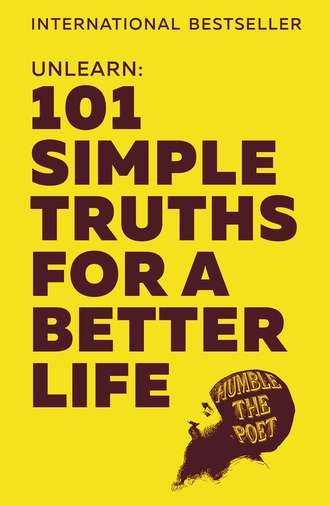
Полная версия
Unlearn: 101 Simple Truths for a Better Life
Now, maybe we’re all just not praying hard enough, or sinning too much, and our endlessly loving lord is showing the errors of our ways through intense but love-filled acts of violence, famine, and other non-pleasantries. Maybe it’s the devil (who by most accounts is a fallen angel), or maybe we should pay a bit more attention when we watch the nature channel and see the baby antelope get eaten alive by a pack of lions, and see in them what we so greatly wish to ignore in ourselves.
Most of us are fortunate not to be in geographical locations or economic scenarios that land us on the front lines of humanity’s worst. That’s something I try not to forget, and it’s a point I’m grateful for.
Sikh heritage advocates that individuals stay armed and trained for combat at all times, regardless if they’re men, women, or children. In all combat, understanding your terrain is essential (word to Sun Tzu).
Folks like 50 Cent and the homey Ryan Blair were able to take their embedded understanding of the harsh terrain of street life and apply it to their business ventures. They both found success working with the challenges instead of against them. These are two individuals you won’t hear complain; instead you’ll witness them adapt until they conquer.
The strongest don’t survive; the most adaptable do. When life is viewed this way, nothing is seen as an obstruction, but merely an obstacle to overcome.
Be like water making its way through cracks. Do not be assertive, but adjust to the object, and you shall find a way around or through it. If nothing within you stays rigid, outward things will disclose themselves.
Empty your mind, be formless. Shapeless, like water. If you put water into a cup, it becomes the cup. You put water into a bottle and it becomes the bottle. You put it in a teapot, it becomes the teapot. Now, water can flow or it can crash. Be water, my friend. —Bruce Lee
The better our relationship is with reality, the better we can get along and live together. It may not be pretty, but it’s all we have.
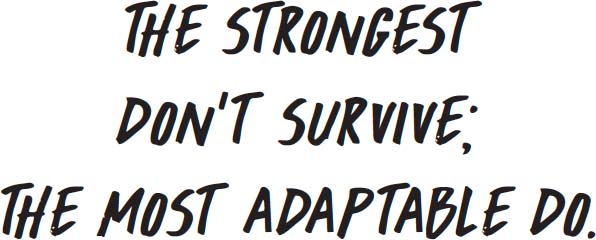

Also, everyone you love and care for will be dead within a dozen decades, some even before you. Why does thinking about that bother us so much?
What other guarantees do we have in life besides death? When folks die, how do we determine if they went too early? Is it based on the average? Does it even make sense to quantify life in terms of time?
“It’s not the days in your life, but the life in your days.”
For many of us, there is a disconnect in our relationship with death. We tend to forget that our days are not promised. Every day you receive is a gift, whether you die at the age of five or fifty; every millisecond of that existence was never assured. I’m not sure where the idea that we’re entitled to life came from. Our only real entitlement is that it’s going to come to an end.
I don’t see this as depressing, but rather the opposite.
The beauty of life is that it’s temporary, and if it lasted forever we’d take it for granted. Many folks are already taking it for granted, as if it will last forever.
Respecting mortality will dramatically enhance how efficiently we spend the time we have here. It also keeps us from sweating the small stuff. (When you compare it to death, all of it is small stuff.)
I think our innate urges to create come from our desire to be immortal. Similar to religion, many of those beliefs revolve around the idea of what happens after we die, and what we need to do beforehand to ensure an awesome afterlife. (It’s great marketing if you think about it: you won’t know if it’s bullshit until after you’re dead, and by then it’s too late to get your time and money back.)
Personally, I see us as just another cell in Mama Nature. Like the cells in our bodies, new cells are created, and old cells die, all serving whatever purpose nature has them programmed for. Mother Nature does a great job of monkey-butlering us to do her bidding without us even knowing. On top of that, we tend to think we’re still in control while doing it (like bees pollinating flowers).
It’s just a view, but most of the things that affect us are based on the views we hold, and our view on death is an important one to meditate on.
Paying attention to our relationship with death is also a great exercise in letting go. Sikh philosophy encourages detachment, and it’s pretty practical advice if you think about it. Our attachment to people, things, ideas, and beliefs can be quite a cause of misery for the short time period we actually have. Everything is temporary—there’s really no need to hold on.
I don’t concern myself with ideas of the supernatural and afterlife, but I do understand why those ideas are appealing. We want to believe there’s more than what’s in front of us, more than just the lights shutting off. The fear of the unknown can compel us to various mindsets.
Regardless, the lights will be going out in all of us, and that’s not a choice. However, HOW we feel about that IS a choice. Let’s enjoy what we have, while we have it, and not spend it worrying about a future we may never see or an ending we can’t avoid.
We’re all going to die, and for me, that’s what makes life worth living. The fact that the folks I love and care about are going to share that fate is motivation to enjoy their company and not take it for granted while I have them.
And when it’s time:
“Don’t cry because it’s over. Smile because it happened.” —Dr. Seuss
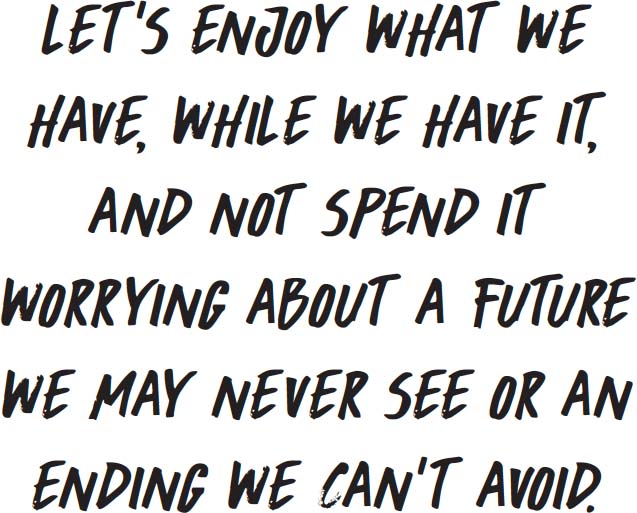

No one will ever know you better than yourself. No one should have the power to define you more than yourself. Seeking approval from others allows them dominion over your identity.
The outside world will never have a great picture of what’s inside; WE barely know. Our opinions of our identity aren’t always valid or accurate either, but they definitely affect how we feel about ourselves.
Closing your eyes, shutting the fuck up, and exploring what’s inside is a great way of getting a firm grasp of who’s really there. That picture will never be captured with a camera and can never be validated by the people around you.
As Dr. Seuss says, “Why fit in when you were born to stand out?” There is no normal, and what’s considered common isn’t common everywhere (the more you travel, the more you’ll realize that). If people don’t like you for who you are, change the people, not yourself.
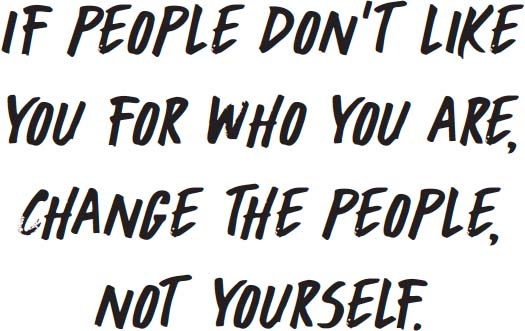

Fear, anxiety, loneliness, discomfort, pain, jitters, or whatever you’re going through is an expensive experience.
It can fuck with your health, your mood, your motivation, and your productivity. It can even mess with your ability to be around other people.
I can’t promise to make it feel better. There are plenty of crooks who you can throw your money at for that. What I can promise is this: you have limitless power to make that shit even worse.
Comparison is the thief of joy, and if you’re having a rough patch, looking at the lives of others will not help. Everyone is going through what they’re going through, but many still get up and keep their lives moving; those folks are called adults. Observing everyone on the surface, then comparing what you see to what you’re feeling deep inside is a guaranteed method of sinking yourself even lower.
This is not to say find consolation in the fact that others have bullshit as well, but more to realize that maybe bullshit is just a part of life. Life doesn’t start after the obstacles; life is the obstacles.
A carefree, stress-free, all-problems-get-solved-within-twenty-two-minutes type of life exists ONLY on television. To begin with, most of the things we call problems aren’t even problems, they’re dilemmas. These dilemmas are generally attributed to our ample leisure time in the first world. Folks in other situations rarely have the luxury to ponder or stress about many of the things we do, mainly because they’re too busy surviving (cue Jim Jefferies singing “Don’t Die Today”).
It’s not my place to evaluate the things that keep you up at night or cause you anxiety. I have, however, realized in my time on this planet that outside of actual death (and a few other exceptions), the intensity of our problems is the simple marriage of our circumstance with our mindset. Sometimes you can’t change the circumstances, but you can ALWAYS change your mindset. (If at this point you said, “Easier said than done, Humble,” you owe me $5.)
Death itself is the one sure-shot promise so there’s really no point in worrying about that. We all have that in common.
Конец ознакомительного фрагмента.
Текст предоставлен ООО «ЛитРес».
Прочитайте эту книгу целиком, купив полную легальную версию на ЛитРес.
Безопасно оплатить книгу можно банковской картой Visa, MasterCard, Maestro, со счета мобильного телефона, с платежного терминала, в салоне МТС или Связной, через PayPal, WebMoney, Яндекс.Деньги, QIWI Кошелек, бонусными картами или другим удобным Вам способом.


